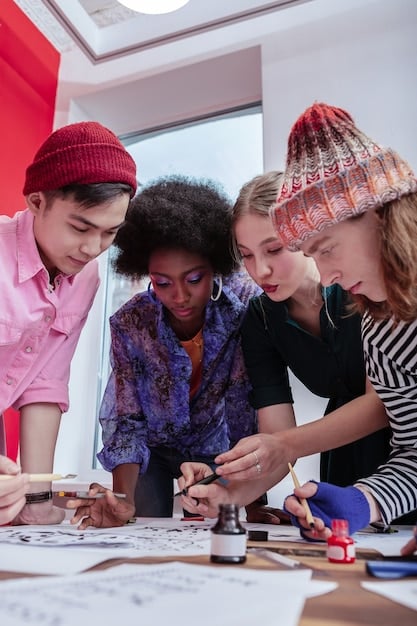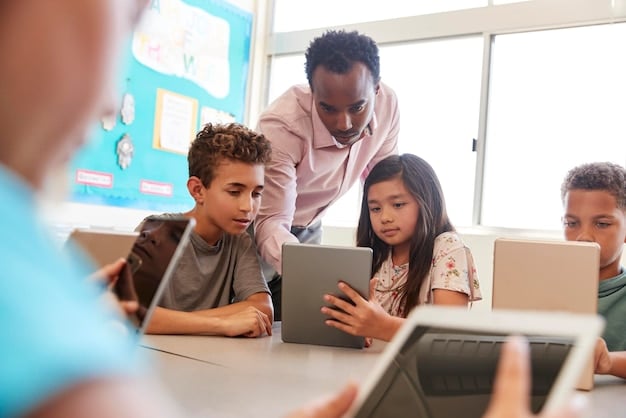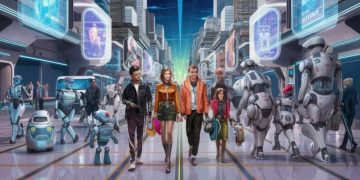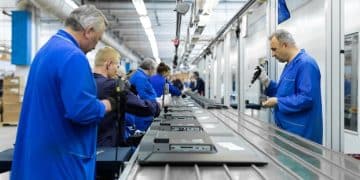The Future of Education: Equipping US Students for Tomorrow’s Jobs

The Future of Education: Preparing US Students for the Jobs of Tomorrow requires a shift towards personalized learning, technological integration, and skills development aligned with the evolving demands of the modern workforce.
The world of work is changing at an unprecedented pace, and it’s essential that the education system in the United States adapts to prepare students for the challenges and opportunities that lie ahead. The Future of Education: Preparing US Students for the Jobs of Tomorrow is not just about teaching traditional subjects but also about fostering critical thinking, creativity, and adaptability.
The Evolving Landscape of the US Job Market
The US job market is undergoing a significant transformation, driven by technological advancements, globalization, and evolving consumer demands. To prepare students effectively, it’s crucial to understand these changes and their implications for the skills and knowledge required in the future workforce.
The Rise of Automation and AI
Automation and artificial intelligence (AI) are reshaping industries, automating routine tasks, and creating new job roles that require specialized skills. This trend necessitates a focus on developing uniquely human skills that cannot be easily replicated by machines.
- Critical thinking and problem-solving
- Creativity and innovation
- Emotional intelligence and communication
The Growing Importance of STEM Skills
Science, Technology, Engineering, and Mathematics (STEM) skills are becoming increasingly important across various industries. A strong foundation in these areas is essential for students to succeed in the tech-driven job market of tomorrow.

In conclusion, the evolving landscape of the US job market demands a proactive and adaptive approach to education, focusing on cultivating skills that are resilient to automation and fundamental to success in a technologically advanced world.
Personalized Learning: Tailoring Education to Individual Needs
Personalized learning is an approach that tailors education to meet the individual needs, interests, and learning styles of each student. It recognizes that every student learns differently and aims to create a more engaging and effective learning experience.
Benefits of Personalized Learning
Personalized learning offers numerous benefits, including increased student engagement, improved academic outcomes, and the development of skills that are essential for success in the 21st century.
- Increased student motivation and engagement
- Improved academic performance
- Development of self-directed learning skills
Implementing Personalized Learning Strategies
Implementing personalized learning requires a shift in mindset and the adoption of new strategies and technologies. Educators need to be equipped with the tools and training to effectively assess student needs and create individualized learning plans.
In conclusion, personalized learning provides a powerful framework for transforming education and preparing US students for the diverse and dynamic challenges of the future job market by focusing on individual growth and unique skill sets.
Integrating Technology into the Classroom
Technology is an integral part of modern life, and its integration into the classroom is essential for preparing students for the digital age. Technology can enhance learning, provide access to vast amounts of information, and foster collaboration and creativity.
Leveraging Digital Tools and Resources
Digital tools and resources can transform the learning experience, making it more engaging, interactive, and personalized. From online learning platforms to educational apps, technology offers a wealth of opportunities for students to explore and learn.
- Interactive simulations and virtual reality
- Online learning platforms and digital textbooks
- Collaboration tools and communication platforms
Addressing the Digital Divide
While technology offers numerous benefits, it’s important to address the digital divide and ensure that all students have equal access to technology and internet connectivity. Bridging this gap is crucial for creating a more equitable and inclusive education system.

In conclusion, integrating technology into the classroom is not just about using the latest gadgets but also about transforming the way students learn and prepare for a future increasingly driven by digital innovation.
Developing Essential Soft Skills
In addition to technical skills, soft skills are becoming increasingly important for success in the modern workplace. These skills, which include communication, collaboration, problem-solving, and critical thinking, are essential for navigating complex challenges and working effectively in teams.
The Importance of Communication and Collaboration
Effective communication and collaboration are crucial for building strong relationships, resolving conflicts, and achieving common goals. Education should focus on developing these skills through group projects, presentations, and collaborative problem-solving activities.
Fostering Critical Thinking and Problem-Solving
Critical thinking and problem-solving are essential for analyzing information, evaluating arguments, and making informed decisions. Educators can foster these skills by encouraging students to ask questions, challenge assumptions, and explore different perspectives.
In conclusion, developing essential soft skills is as vital as acquiring technical knowledge, as these skills equip students with the ability to adapt, innovate, and thrive in collaborative environments.
Focusing on Experiential Learning
Experiential learning, which includes internships, apprenticeships, and project-based learning, provides students with real-world experiences that enhance their understanding of concepts and develop practical skills. This approach bridges the gap between theory and practice, preparing students for the demands of the workforce.
The Benefits of Internships and Apprenticeships
Internships and apprenticeships offer students opportunities to gain hands-on experience, network with professionals in their field, and develop valuable skills that are highly sought after by employers. These experiences can significantly enhance their job prospects after graduation.
Implementing Project-Based Learning
Project-based learning involves engaging students in real-world projects that require them to apply their knowledge and skills to solve authentic problems. This approach fosters creativity, critical thinking, and collaboration, preparing students for the challenges of the modern workplace.
In conclusion, focusing on experiential learning provides students with the practical skills and real-world experience necessary to excel in their chosen careers and contribute to the future workforce.
Cultivating Creativity and Innovation
Creativity and innovation are essential for driving progress and solving complex problems. Education should foster these skills by encouraging students to think outside the box, explore new ideas, and take risks. This approach is crucial for preparing students to be innovators and entrepreneurs in the future.
Encouraging Design Thinking and Experimentation
Design thinking is a problem-solving approach that encourages students to empathize with users, define problems, generate ideas, prototype solutions, and test them iteratively. This process fosters creativity, collaboration, and critical thinking.
Promoting Entrepreneurship and Innovation
Education should promote entrepreneurship and innovation by providing students with opportunities to develop their own ideas, create business plans, and pitch their concepts to investors. This approach prepares students to be innovators and leaders in the future.
In conclusion, cultivating creativity and innovation is vital for preparing the next generation of leaders and problem-solvers, equipping them with the skills to drive progress and create a better future.
| Key Point | Brief Description |
|---|---|
| 💡 Personalized Learning | Tailoring education to individual needs and learning styles. |
| 💻 Technology Integration | Incorporating digital tools to enhance learning and access information. |
| 🤝 Soft Skills | Developing communication, collaboration, and problem-solving abilities. |
| 🚀 Experiential Learning | Providing hands-on experience through internships and projects. |
FAQ
▼
Focusing on the future of education is critical to ensuring US students are ready for the evolving job market and can compete globally. It addresses the skills gap and promotes innovation.
▼
Personalized learning caters to individual needs, leading to increased engagement, better academic outcomes, and improved self-directed learning skills tailored to their specific strengths.
▼
Technology offers interactive learning, vast access to information, and fosters collaboration. These elements are essential for students in preparing for a digitally driven world.
▼
Soft skills like communication, collaboration, and problem-solving are vital for navigating complex challenges and ensuring effective teamwork, leading to better job performance.
▼
Experiential learning offers real-world experiences through internships and projects, bridging theoretical knowledge with practical skills highly valued by employers for better job readiness.
Conclusion
The Future of Education: Preparing US Students for the Jobs of Tomorrow requires a fundamental shift in how we approach teaching and learning. By embracing personalized learning, integrating technology, developing essential soft skills, focusing on experiential learning, and cultivating creativity and innovation, we can equip US students with the skills and knowledge they need to thrive in the ever-evolving job market and contribute to a brighter future.





